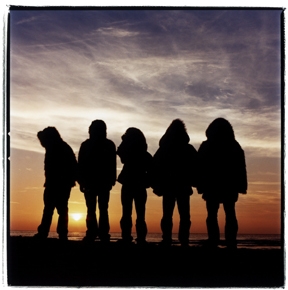Spotlight: Mogwai

When asked why he thinks his band has successfully managed to capture fans’ attention for 15 years now, Mogwai bassist Dominic Aitchison says, “I really don’t know. I think the same thing: Why are these people all coming to see us after seven albums? Don’t they know what we sound like by now?”
Yes and no. Mogwai’s new record, Hardcore Will Never Die, But You Will – its first on Sub Pop Records – resonates with the Scottish band’s signature instrumental post-rock style, and surges with new energy and unheard experimental tones. Replete with vocals (see “Mexican Grand Prix” ), the new disc is notable given that the band has largely been defined by eschewing conventional lyrical methods in favor of distorted instrumentation.
“It was never talked about to have more vocals on this record,” Aitchison notes over the phone from his home in Glasgow. “But I think we always want to try and do something slightly different from the previous one. I think vocals are something we don’t do very often, so it’s always a bit of a challenge to use them and make them work. More songs were recorded for the record that had vocals but those songs didn’t make it on. Maybe we’re getting a bit more confident with the vocals because nobody in the band is a particularly great singer.”
The fivesome, which includes Aitchison, guitarist Stuart Braithwaite, guitarist John Cummings, guitarist/pianist Barry Burns and drummer Martin Bulloch, toured heavily on its last album, 2008’s masterful The Hawk Is Howling, and released a live DVD/CD, Special Moves, last year. After all that, Mogwai went home to Scotland where band members wrote much of Hardcore separately during the first half of 2010 before coming together at summer’s end to suss out what they had developed and written.
“We don’t ever really discuss what we want the music to sound like,” Aitchison says in a thick brogue. “Any time we’ve done that in the past, the record’s never ended up that way. We all go in, write a bunch of songs and see what happens – see what we’re left with at the end. We definitely had no plan for this record other than [knowing that] the previous album had been quite sparse and low-key, I think we wanted to make something that wasn’t quite as miserable.”
The resulting disc is noticeably lighter than the band’s past releases, although it still manages to convey similar depth. “Rano Pano” uses the band’s fuzzed out guitars to an ambient effect, creating an almost airy sense that is comparably more buoyant than tracks like “Batcat” and “The Sun Smells Too Loud” off The Hawk Is Howling. With Hardcore, the band also embraces nuance far more warmly than it did on earlier albums. “How To Be a Werewolf” builds slowly, sliding layer upon layer of sonics which eventually yields a complex and thunderous orchestration of sounds.
Aitchison, who says Mogwai usually rehearses for two to three months before embarking on a tour, finds that the band’s live shows have evolved into a separate entity from the records.
“When we first started out, we were definitely far too loud because we were young and that’s what we wanted,” Aitchison says. “We wanted it to be absolutely punishing. I think a couple years ago, we realized there’s a certain level of noise – a certain volume – and you can’t go past it or it’s impossible to pick out any of the music. It just turns into noise, and that’s not really that much fun when it gets to that point. You want to still be able to hear the music.”
Unlike past albums, the band did not consider how the tracks for Hardcore would translate live which, at face value, is odd given that much of its reputation is staked on its tumultuous, thundering live performances. “We’ve found they should both be completely separate,” believes Aitchison. “Live, a song always sounds a little bit different. We always sound a little bit different live than we do on the record, anyway, don’t we?”
If not different, then definitely louder.



















